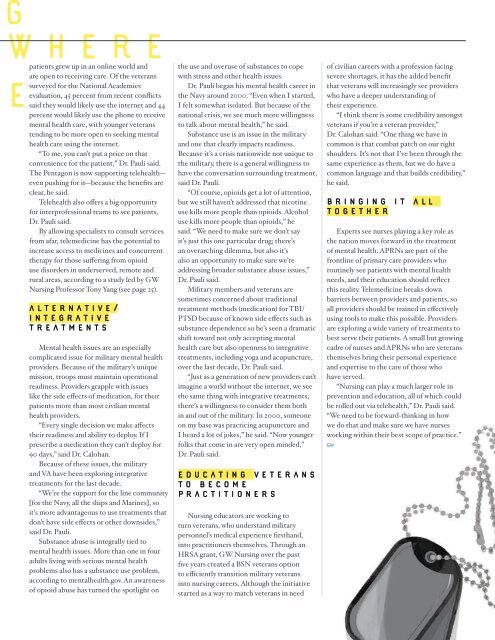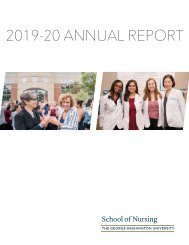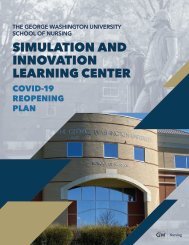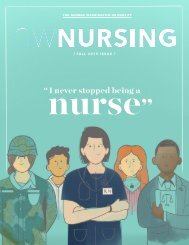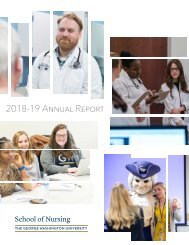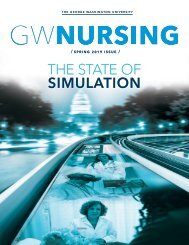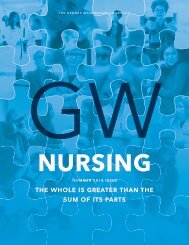GW Nursing Magazine Fall 2018
GW Nursing is a publication of the George Washington University School of Nursing. The magazine tells the story of GW nurses and their endeavors in the areas of education, research, policy and practice.
GW Nursing is a publication of the George Washington University School of Nursing. The magazine tells the story of GW nurses and their endeavors in the areas of education, research, policy and practice.
You also want an ePaper? Increase the reach of your titles
YUMPU automatically turns print PDFs into web optimized ePapers that Google loves.
g<br />
w h e r e<br />
epatients grew up in an online world and<br />
are open to receiving care. Of the veterans<br />
surveyed for the National Academies<br />
evaluation, 45 percent from recent conflicts<br />
said they would likely use the internet and 44<br />
percent would likely use the phone to receive<br />
mental health care, with younger veterans<br />
tending to be more open to seeking mental<br />
health care using the internet.<br />
“To me, you can’t put a price on that<br />
convenience for the patient,” Dr. Pauli said.<br />
The Pentagon is now supporting telehealth—<br />
even pushing for it—because the benefits are<br />
clear, he said.<br />
Telehealth also offers a big opportunity<br />
for interprofessional teams to see patients,<br />
Dr. Pauli said.<br />
By allowing specialists to consult services<br />
from afar, telemedicine has the potential to<br />
increase access to medicines and concurrent<br />
therapy for those suffering from opioid<br />
use disorders in underserved, remote and<br />
rural areas, according to a study led by <strong>GW</strong><br />
<strong>Nursing</strong> Professor Tony Yang (see page 25).<br />
alternative/<br />
integrative<br />
treatments<br />
Mental health issues are an especially<br />
complicated issue for military mental health<br />
providers. Because of the military’s unique<br />
mission, troops must maintain operational<br />
readiness. Providers grapple with issues<br />
like the side effects of medication, for their<br />
patients more than most civilian mental<br />
health providers.<br />
“Every single decision we make affects<br />
their readiness and ability to deploy. If I<br />
prescribe a medication they can’t deploy for<br />
90 days,” said Dr. Calohan.<br />
Because of these issues, the military<br />
and VA have been exploring integrative<br />
treatments for the last decade.<br />
“We’re the support for the line community<br />
[for the Navy, all the ships and Marines], so<br />
it’s more advantageous to use treatments that<br />
don’t have side effects or other downsides,”<br />
said Dr. Pauli.<br />
Substance abuse is integrally tied to<br />
mental health issues. More than one in four<br />
adults living with serious mental health<br />
problems also has a substance use problem,<br />
according to mentalhealth.gov. An awareness<br />
of opioid abuse has turned the spotlight on<br />
the use and overuse of substances to cope<br />
with stress and other health issues.<br />
Dr. Pauli began his mental health career in<br />
the Navy around 2000. “Even when I started,<br />
I felt somewhat isolated. But because of the<br />
national crisis, we see much more willingness<br />
to talk about mental health,” he said.<br />
Substance use is an issue in the military<br />
and one that clearly impacts readiness.<br />
Because it’s a crisis nationwide not unique to<br />
the military, there is a general willingness to<br />
have the conversation surrounding treatment,<br />
said Dr. Pauli.<br />
“Of course, opioids get a lot of attention,<br />
but we still haven’t addressed that nicotine<br />
use kills more people than opioids. Alcohol<br />
use kills more people than opioids,” he<br />
said. “We need to make sure we don’t say<br />
it’s just this one particular drug; there’s<br />
an overarching dilemma, but also it’s<br />
also an opportunity to make sure we’re<br />
addressing broader substance abuse issues,”<br />
Dr. Pauli said.<br />
Military members and veterans are<br />
sometimes concerned about traditional<br />
treatment methods (medication) for TBI/<br />
PTSD because of known side effects such as<br />
substance dependence so he’s seen a dramatic<br />
shift toward not only accepting mental<br />
health care but also openness to integrative<br />
treatments, including yoga and acupuncture,<br />
over the last decade, Dr. Pauli said.<br />
“Just as a generation of new providers can’t<br />
imagine a world without the internet, we see<br />
the same thing with integrative treatments;<br />
there’s a willingness to consider them both<br />
in and out of the military. In 2000, someone<br />
on my base was practicing acupuncture and<br />
I heard a lot of jokes,” he said. “Now younger<br />
folks that come in are very open minded,”<br />
Dr. Pauli said.<br />
educating veterans<br />
to become<br />
practitioners<br />
<strong>Nursing</strong> educators are working to<br />
turn veterans, who understand military<br />
personnel’s medical experience firsthand,<br />
into practitioners themselves. Through an<br />
HRSA grant, <strong>GW</strong> <strong>Nursing</strong> over the past<br />
five years created a BSN veterans option<br />
to efficiently transition military veterans<br />
into nursing careers. Although the initiative<br />
started as a way to match veterans in need<br />
of civilian careers with a profession facing<br />
severe shortages, it has the added benefit<br />
that veterans will increasingly see providers<br />
who have a deeper understanding of<br />
their experience.<br />
“I think there is some credibility amongst<br />
veterans if you’re a veteran provider,”<br />
Dr. Calohan said. “One thing we have in<br />
common is that combat patch on our right<br />
shoulders. It’s not that I’ve been through the<br />
same experience as them, but we do have a<br />
common language and that builds credibility,”<br />
he said.<br />
bringing it a l l<br />
together<br />
Experts see nurses playing a key role as<br />
the nation moves forward in the treatment<br />
of mental health. APRNs are part of the<br />
frontline of primary care providers who<br />
routinely see patients with mental health<br />
needs, and their education should reflect<br />
this reality. Telemedicine breaks down<br />
barriers between providers and patients, so<br />
all providers should be trained in effectively<br />
using tools to make this possible. Providers<br />
are exploring a wide variety of treatments to<br />
best serve their patients. A small but growing<br />
cadre of nurses and APRNs who are veterans<br />
themselves bring their personal experience<br />
and expertise to the care of those who<br />
have served.<br />
“<strong>Nursing</strong> can play a much larger role in<br />
prevention and education, all of which could<br />
be rolled out via telehealth,” Dr. Pauli said.<br />
“We need to be forward-thinking in how<br />
we do that and make sure we have nurses<br />
working within their best scope of practice.”<br />
nursing.gwu.edu | 19


